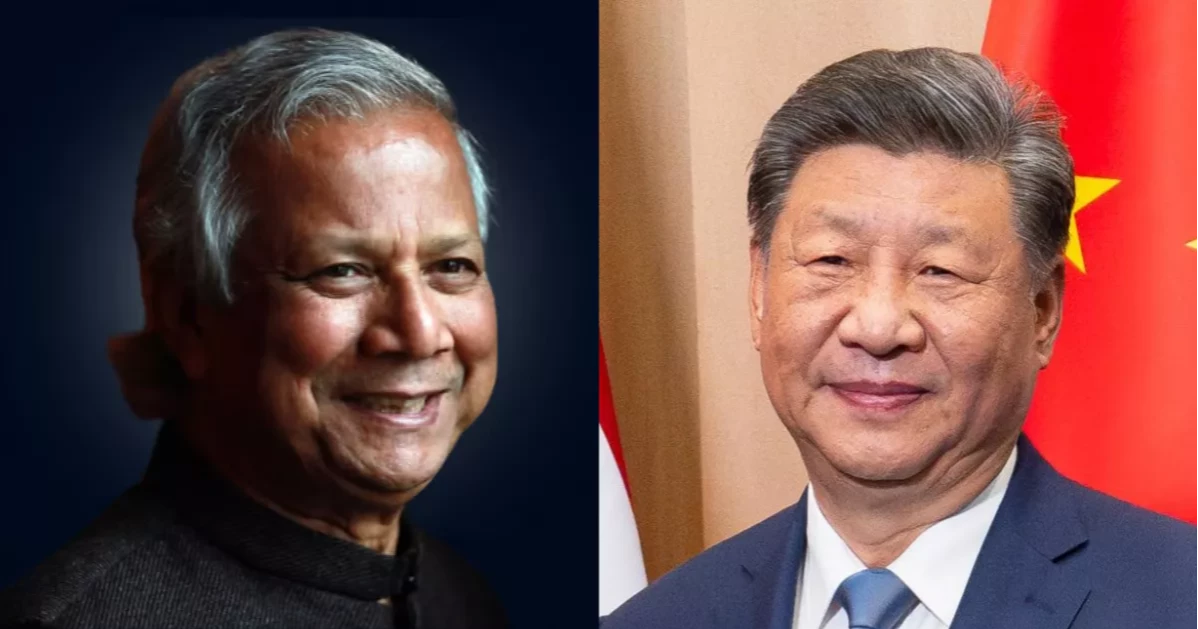Dhaka – Bangladesh is eyeing deeper economic cooperation and elevating bilateral relations with China centering the much-anticipated visit by Chief Adviser Muhammad Yunus to China.
Marking the two nation’s 50-year diplomatic relationship, the four-day visit, amid heightened tensions with neighbouring India, carries significant geopolitical weight as Bangladesh is seeking to strengthen trade ties, attract Chinese investment and expand cooperation in sectors, including healthcare, education, and water management.
“Our priority is to elevate our friendly relations with Beijing further, particularly by increasing economic cooperation. We want more investment from China and aim to export more products there,” Foreign Adviser Touhid Hossain told reporters.
Foreign ministry officials say that attracting Chinese investment to Special Economic Zone in Chattogram, river water management and addressing the Rohingya crisis will be major areas of discussion during the four-day visit.
Both Dhaka and Beijing have been working on signing several memoranda of understanding, including on trade, culture, modernisation of Mongla Port and water management during the trip, they add.
Muhammad Yunus is scheduled to leave for China on March 26 to attend the Boao Forum for Asia Conference in Hainan Province.
On March 28, he is expected to meet President Xi Jinping at the Great Hall of the People in Beijing.
Ahead of the visit, Chinese Ambassador to Bangladesh Yao Wen said the visit of Chief Adviser Mohammad Yunus to China would be a milestone.
“It will be very successful, productive and a milestone visit with some announcements,” he told reporters after his meeting with foreign secretary Jashim Uddin at the Ministry of Foreign Affairs.
The ambassador said this is something between Bangladesh and China as the two countries are celebrating 50 years of diplomatic relations.
When asked whether Bangladesh will sign any agreements with China, Foreign Affairs Adviser hinted at signing of the MoUs.
“No agreement will be signed during the visit. But several MoUs are likely to be inked,” he said.
During the visit, Dhaka may also raise the issue of China’s plan to build a mega-hydropower dam across the Yarlung Tsangpo River in Tibet, which can have implications on the lower riparian countries, including India and Bangladesh.
According to the officials, China may propose that Bangladesh should join the Global Development Initiative and Global Security Initiative.
Experts consider the visit a significant one amid a growing anti-India sentiment in the country after the fall of Awami League government led by Sheikh Hasina.
They say that ousted premier Sheikh Hasina cut short her China trip in July last after failing to achieve her target.
Before Hasina’s visit, Beijing reportedly promised Dhaka a $ 5 billion loan assistance. But the outcome of the deal dropped to about $100 million only.
They also say that neighbouring India will also closely observe the visit of CA as China has already showed interest to construct the Teesta barrage and proposed Bangladesh to join its Global Development Initiative.
A data of the Bangladesh Bureau of Statistics shows that China held its position as Bangladesh’s largest trading partner in FY24, with bilateral trade amounting to Tk 2.246 trillion.
India remained the second-largest trading partner, recording Tk 1.463 trillion in two-way trade during the same period, the data revealed.
Meanwhile, a new era of cooperation began with China following the Foreign Adviser’s request to Chinese government to dedicate hospitals for Bangladeshi patients in Kunming. The first batch of 14 patients went to China in early March this year.
The interim government came up with the proposal after India tightened visas for Bangladeshis.
A foreign ministry official said Dhaka also proposed China for setting up a high-quality hospital chain in Bangladesh.
The proposal is being positively considered by the Chinese government, said the official.
Experts say that Bangladesh is going through a transitional period.
Muhammad Yunus, capitalising his image, may encourage some Chinese companies to investment afresh in Bangladesh, they said.
Although China provides Bangladesh with zero-tariff market access, Bangladesh’s exports to China amount to less than $1 billion.
As part of the efforts to narrow the trade gap, China will be importing mango, guava, and jackfruit in big quantities, Yao said recently.
International Relations expert Professor Imtiaz Ahmed emphasised the visit’s symbolic significance. “This visit sets the stage for the next elected government to foster long-term partnerships,” he noted.
Former Bangladesh ambassador to China Munshi Fayaz Ahmad said the visit would strengthen ties, but major projects like Teesta would likely wait until after Bangladesh’s next elections.


